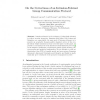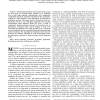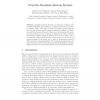148 search results - page 9 / 30 » Self-stabilization of Byzantine Protocols |
IEEEARES
2008
IEEE
14 years 4 months ago
2008
IEEE
We consider scheduling real-time tasks in the presence of message loss and Byzantine node failures in unreliable networks. We present scheduling algorithms called RTQG and RTQG-B....
CHARME
2003
Springer
14 years 3 months ago
2003
Springer
Intrusion-tolerance is the technique of using fault-tolerance to achieve security properties. Assuming that faults, both benign and Byzantine, are unavoidable, the main goal of Int...
TDSC
2011
13 years 4 months ago
2011
— Randomized agreement protocols have been around for more than two decades. Often assumed to be inefficient due to their high expected communication and computation complexitie...
FOCS
2006
IEEE
14 years 3 months ago
2006
IEEE
In this paper, we use random-selection protocols in the full-information model to solve classical problems in distributed computing. Our main results are the following: • An O(l...
OTM
2009
Springer
14 years 4 months ago
2009
Springer
Byzantine Quorum Systems is a replication technique used to ensure availability and consistency of replicates data even in presence of arbitrary faults. This paper presents a Byzan...




